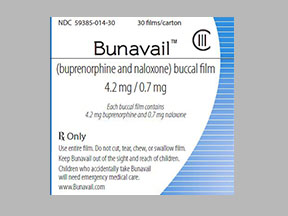
Bunavail Coupons & Savings Card – Discount Prices from $250.54
My prescription
Edit
4.2-0.7MG, Bunavail (30 Films)
Select pharmacy

CVS
$250.54
COUPON PRICE
Walgreens
$260.95
COUPON PRICEBunavail savings card
Show this card to your pharmacist
CVS
$250.54
BIN
ID
PCN
GRP
019876
LH10B7A1F2
CHIPPO
LHX
Powered by
Related opioid agonist/antagonists prescriptions
More prescriptions for opioid dependence
Related opioid agonist/antagonists prescriptions
More prescriptions for opioid dependence
Price history for Bunavail
30 Films, 4.2-0.7MG
Average retail price for Bunavail
Average SaveHealth price for Bunavail
Our price history data is based on aggregated prescription data collected from participating pharmacies in America. Our prescription data updates daily to reflect the latest price changes. If you notice a missing data point, it means there wasn't sufficient data available to generate a monetary value for that date.
*Retail prices are based on pharmacy claims data, and may not be accurate when we don't have enough claims.
Bunavail dosage forms
Dosage Quantity Price from Per unit 4.2-0.7MG 30 Films $250.54 $8.35 4.2-0.7MG 60 Films $513.09 $8.55 4.2-0.7MG 90 Films $775.63 $8.62
| Dosage | Quantity | Price from | Per unit |
|---|---|---|---|
| 4.2-0.7MG | 30 Films | $250.54 | $8.35 |
| 4.2-0.7MG | 60 Films | $513.09 | $8.55 |
| 4.2-0.7MG | 90 Films | $775.63 | $8.62 |
Bunavail Warnings
The following information outlines critical safety warnings associated with the use of Suboxone film (buprenorphine/naloxone). Please read carefully and consult your healthcare provider if you have any questions or concerns.
Addiction and Misuse Risk: Suboxone is a Schedule III controlled substance due to its inclusion of buprenorphine, which poses a risk for misuse and dependence. Using more than the prescribed dosage can increase the risk of addiction and severe side effects, including dangerously slow breathing and overdose. Individuals with a history of alcohol or substance use disorder should be particularly cautious.
Respiratory Depression: Buprenorphine in Suboxone can lead to dangerously slow breathing, which may be life-threatening, especially when combined with benzodiazepines, opioids, or alcohol. People over 65, those with chronic obstructive pulmonary disease (COPD), or other conditions that cause slow breathing should exercise caution.
Opioid Overdose Risk: There is a risk of relapse and overdose in people treated for opioid use disorder. Overdose can occur even at recommended doses and is potentially fatal, particularly in children who accidentally ingest the medication. Those with a history of opioid use disorder or previous overdoses should be aware.
Impaired Concentration and Sleepiness: Suboxone can cause extreme drowsiness and impair cognitive function. Concurrent use with alcohol or medications such as sedatives can exacerbate these effects. This is especially relevant for individuals over 65.
Pregnancy Risks: Use of Suboxone during pregnancy can result in the unborn baby becoming dependent on the medication. Pregnant individuals should discuss potential risks with their healthcare provider.
Adrenal Insufficiency: Long-term use of Suboxone can lead to low adrenal hormone levels, resulting in symptoms like nausea, tiredness, and dizziness. If you experience these symptoms, contact your healthcare provider.
Withdrawal Symptoms: Long-term use can cause physical dependence, and sudden cessation may lead to withdrawal symptoms, such as anxiety and body aches. Gradual dose reduction is advised.
Liver Damage: Use of buprenorphine-containing medications can lead to liver damage. Regular liver function tests are recommended, especially for those with a history of liver damage, hepatitis B or C, or injection drug use.
Dental Health Issues: Some users have experienced dental problems, including cavities and tooth loss, due to the medication dissolving in the mouth.
Heart Rhythm Abnormalities (QT Prolongation): Buprenorphine can cause QT prolongation, potentially leading to severe heart rhythm issues. Those with existing heart conditions should be cautious.
Low Blood Pressure: Suboxone may cause a significant drop in blood pressure, leading to dizziness or fainting. Standing up slowly from a sitting or lying position can help minimize these effects.
Not Suitable for Pain Management or Opioid-Naïve Individuals: Suboxone is not intended for pain relief or individuals who have never taken opioids, as fatal overdoses have occurred under these circumstances.
Contraindications: Suboxone should not be used by individuals with a severe allergy to buprenorphine or naloxone. If applicable, discuss alternatives with your healthcare provider.
Bunavail Side Effects
When taking this medication, it's important to be aware of potential side effects. Many people may experience mild and common side effects, which generally do not cause major issues. These include headaches, which occur in about 36% of users, and symptoms of withdrawal such as anxiety and irritability, affecting 25%. Other common side effects are general pain (22%), nausea (15%), increased sweating (14%), trouble sleeping (14%), constipation (12%), and stomach pain (11%). These symptoms often resolve on their own, but if they persist or worsen, it’s advisable to consult a healthcare provider. In addition to these common effects, there are other side effects reported by some users. These include dizziness, mouth numbness, burning sensations in the mouth or tongue, and swelling inside the mouth. You might also experience swelling in the hands or ankles, body weakness, back pain, chills, a runny nose, blurry vision, diarrhea, vomiting, a racing heart, or signs of infection. Although these effects are less common, it’s important to monitor them and seek advice if they become troublesome. There are also serious side effects that, while rare, necessitate immediate medical attention. These include symptoms of opioid withdrawal, such as restlessness and muscle aches, as well as dangerously slow breathing marked by bluish lips or fingers. Heart rhythm problems can present as chest pain or a fluttering sensation, and serious allergic reactions may cause rash, hives, fast heartbeat, or swelling around the eyes or lips. If any of these severe symptoms occur, urgent medical care is crucial.
Bunavail Interactions
When taking Bunavail, it's important to be aware of potential interactions with other substances, as these can affect how the medication works and may lead to serious side effects. Here are some key interactions to consider:
Central Nervous System (CNS) Depressants: Combining Bunavail with other CNS depressants, such as benzodiazepines (e.g., Diazepam, Alprazolam), sedatives, muscle relaxants, or alcohol, can enhance sedative effects. This may result in profound drowsiness, respiratory depression, coma, or even death. It's crucial to avoid using these substances together unless specifically directed by a healthcare provider.
Certain Medications: Some drugs can alter the effectiveness of Bunavail by affecting how it's metabolized in the body. For instance:
CYP3A4 Inhibitors: Medications like certain antibiotics (e.g., Erythromycin), antifungals (e.g., Ketoconazole), and HIV protease inhibitors (e.g., Ritonavir) can increase Bunavail levels, potentially leading to enhanced effects or side effects. Monitoring and possible dose adjustments may be necessary when these are used concurrently.
CYP3A4 Inducers: Drugs such as Rifampin, Carbamazepine, and Phenytoin can decrease Bunavail levels, possibly reducing its effectiveness. Your doctor may need to adjust your Bunavail dose if you're taking these medications.
Serotonergic Drugs: Using Bunavail alongside medications that affect serotonin levels, like certain antidepressants (e.g., SSRIs, SNRIs), can increase the risk of serotonin syndrome—a potentially life-threatening condition. Symptoms include agitation, hallucinations, rapid heartbeat, and high blood pressure. Immediate medical attention is required if these occur.
Herbal Supplements: Some herbal products, such as St. John's Wort, can interact with Bunavail, potentially altering its effectiveness. Always inform your healthcare provider about any supplements you're taking.
Alcohol: Consuming alcohol while on Bunavail can intensify CNS depressant effects, leading to dangerous side effects like respiratory depression and loss of consciousness. It's advisable to avoid alcohol during treatment.
Other Medications: Certain drugs, including antihistamines (e.g., diphenhydramine), antipsychotics, and specific antibiotics, may interact with Bunavail. These interactions can lead to increased side effects or reduced effectiveness of the medications involved.
Always inform your healthcare provider about all medications, supplements, and substances you're using to ensure safe and effective treatment with Bunavail.
Why was Bunavail discontinued?
Bunavail was discontinued due to business reasons, not because of safety or efficacy concerns. The decision was made by the manufacturer, BioDelivery Sciences International, as part of a strategic business decision.
What is Bunavail used for?
Bunavail is used for the treatment of opioid dependence. It contains buprenorphine and naloxone, which help reduce withdrawal symptoms and cravings associated with opioid addiction. It is typically used as part of a comprehensive treatment plan that includes counseling and behavioral therapy.
Is bunavail still available?
Bunavail, a buccal film used for opioid dependence treatment, was discontinued by its manufacturer in 2020. It is no longer available on the market.
What is the generic name for Bunavail?
The generic name for Bunavail is buprenorphine and naloxone.
